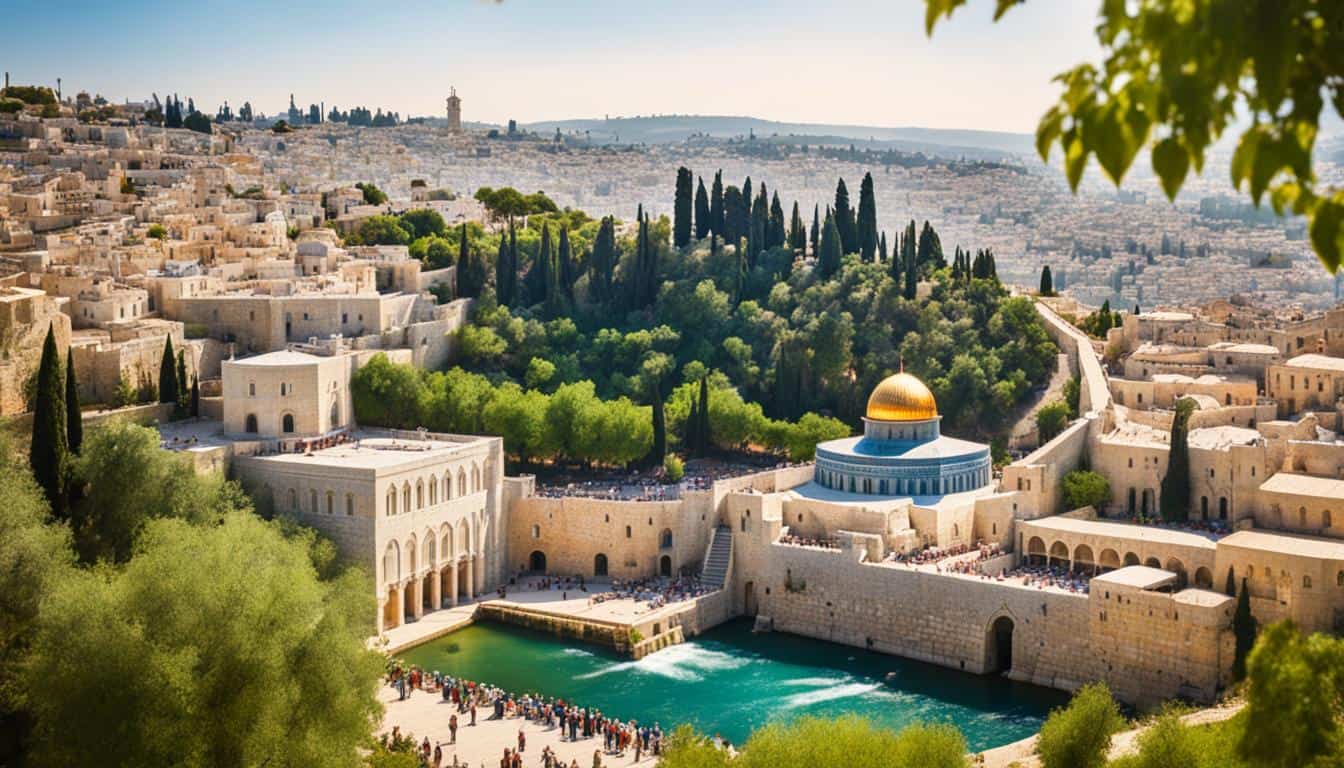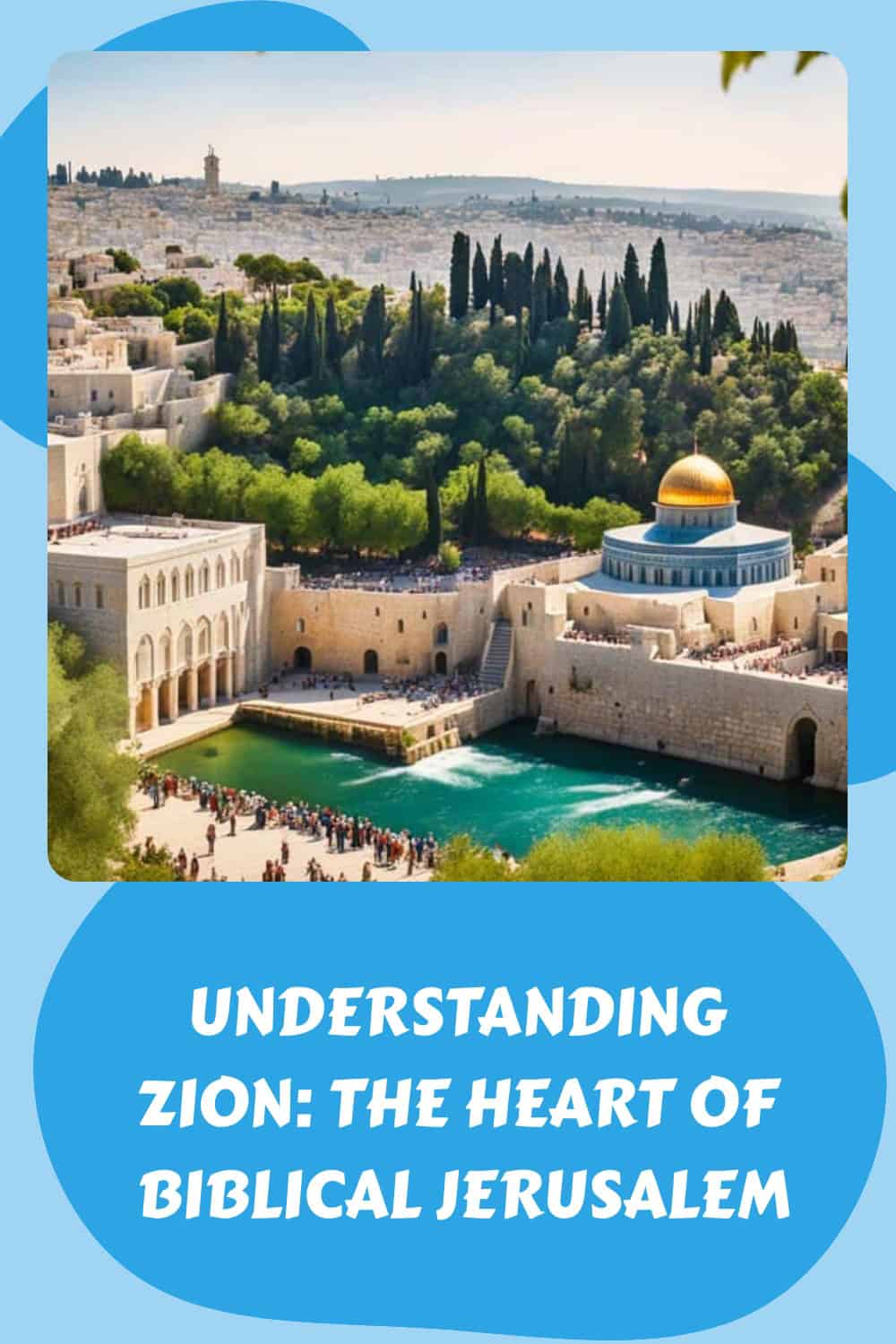Table of Contents
Have you ever wondered about the profound legacy and spiritual significance of Zion, the heart of biblical Jerusalem?
How does this ancient city hold such tremendous importance in the story of faith and redemption?
Join us as we embark on a journey to uncover the deep meaning and significance of Zion. We will explore biblical verses, delve into historical events, and connect them with Jesus’ life and mission.
Prepare to be amazed by the intricate tapestry that weaves together Zion, Jesus, and the everlasting message of hope and salvation.
Throughout this article, we will unpack the biblical references, drawing upon the King James Version of the Bible, to demonstrate the timeless relevance of Zion.
As we reflect on its profound connections with Jesus’ presence, kingship, mission, suffering, resurrection, and ultimate redemption, we will gain a deeper understanding of God’s plan for humanity.
So, are you ready to embark on this enlightening exploration of Zion?
Let’s dive in and discover the hidden truths that lie within the heart of biblical Jerusalem.
Zion as God’s Dwelling Place: The Incarnation of Jesus
In Psalm 76:2, Zion is described as the dwelling place of God. This profound statement lays the foundation for understanding the incarnation of Jesus. As we explore this connection, we gain insights into the significance of God’s intimate relationship with humanity.
“In Judah is God known: his name is great in Israel. In Salem also is his tabernacle, and his dwelling place in Zion.” – Psalm 76:2
John 1:14 further reveals the fulfillment of this prophecy, stating that “the Word became flesh and made his dwelling among us.” Jesus, the incarnate Word of God, chose to dwell among humanity, establishing a deep connection between Zion and His presence.
By envisioning Zion as God’s dwelling place and understanding Jesus as the embodiment of God’s presence, we recognize the profound significance of the incarnation. It signifies not only God’s desire to be near us but also His willingness to become one of us, entering into our human experience.
This divine act of dwelling among us showcases God’s love, grace, and desire for intimate relationship with His creation. As we contemplate the connection between Zion and Jesus’ incarnation, we are reminded of the depth of God’s commitment to us and His redemptive plan for humanity.
Significance of Zion as God’s Dwelling Place
| Key Points | Explanation |
|---|---|
| Divine Manifestation | Zion serves as the physical manifestation of God’s presence on Earth, emphasizing His accessibility and desire for relationship. |
| God’s Proximity | The association of God’s dwelling place with Zion highlights His nearness to His people, signifying His involvement in their lives. |
| Intimate Connection | The choice of Zion as God’s dwelling place underscores the intimate relationship He seeks with humanity, revealing His heart of love and compassion. |
| Redemptive Purpose | The incarnation of Jesus, who dwelt among us, portrays God’s redemptive plan unfolding through His presence in Zion. |
The City of David and the Son of David: Jesus’ Kingship
In the biblical narrative, Zion is often referred to as the city of David, as mentioned in 1 Kings 8:1. This designation holds significant meaning when we consider Jesus’ lineage as the Son of David, as stated in Matthew 1:1.
These connections between Zion, the city of David, and Jesus’ lineage have profound implications for understanding Jesus’ kingship as the promised Messiah.
Throughout Scripture, the city of David symbolizes both a physical location and a spiritual representation of God’s chosen people.
It was within the walls of this city that David established his reign and, more importantly, where God dwelled among His people. The city of David became a focal point for the establishment of God’s kingdom on earth.
“And all the men of Israel assembled themselves unto King Solomon at the feast in the month Ethanim, which is the seventh month.” – 1 Kings 8:1 (KJV)
By designating Zion as the city of David, the Bible emphasizes its significance not only in the historical context but also in the spiritual realm.
This connection provides a framework for understanding Jesus’ identity and kingship. As the Son of David, Jesus inherits the royal lineage and fulfills the messianic prophecies surrounding the Davidic dynasty.
“The book of the generation of Jesus Christ, the son of David, the son of Abraham.” – Matthew 1:1 (KJV)
Jesus’ lineage as the Son of David establishes His rightful claim to the throne and emphasizes His role as the long-awaited Messiah. The concept of kingship is deeply intertwined with Zion and the city of David, as it signifies the establishment of God’s reign on earth through the Davidic line.
As the promised Messiah, Jesus’ kingship extends far beyond earthly realms. Through His life, teaching, and sacrificial death, Jesus inaugurates a spiritual kingdom that transcends geographical boundaries.
To illustrate this further, let’s visualize the connection between the city of David, Jesus’ lineage as the Son of David, and His kingship:
| City of David | Son of David | Jesus’ Kingship |
|---|---|---|
| Zion | Jesus’ lineage | Establishment of God’s kingdom on earth |
| Physical location | Lineage inheritance | Transcendent spiritual reign |
As seen in the table above, the city of David serves as the foundation for Jesus’ lineage and ultimate kingship. This connection highlights the continuity of God’s plan throughout history, culminating in the reign of Jesus Christ.
By understanding the significance of the city of David and Jesus’ lineage as the Son of David, we gain deeper insight into Jesus’ role as the promised Messiah and the establishment of His spiritual kingdom. Through Jesus’ reign, we find hope, redemption, and the fulfillment of God’s eternal plan for humanity.
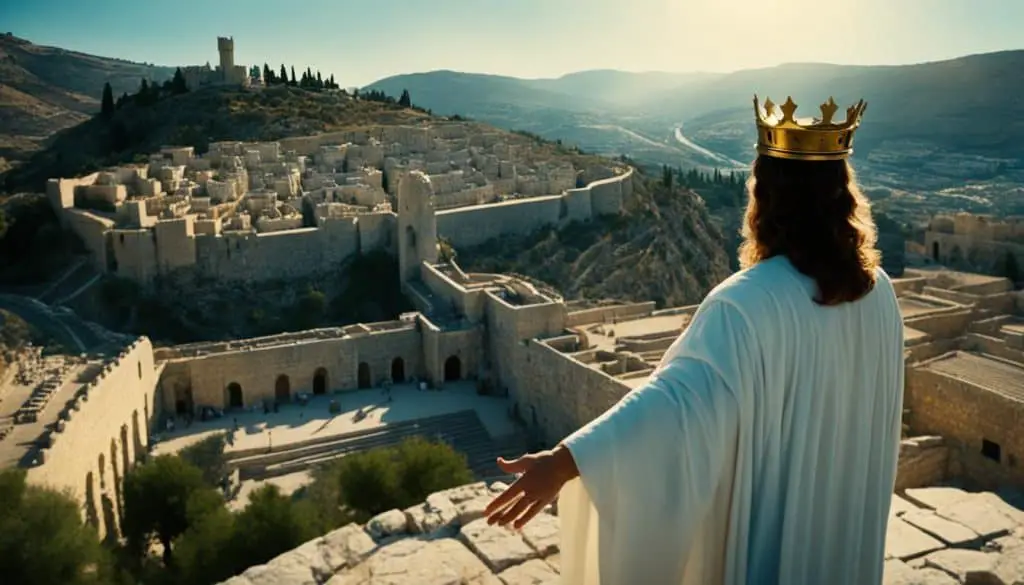
In the next section, we will explore Zion as the place of salvation and its connection to Jesus’ mission.
Zion, the Place of Salvation: Jesus’ Mission
In the grand tapestry of biblical prophecy, Isaiah 46:13 speaks of salvation coming to Zion, the place where God’s redemptive plan unfolds.
This profound connection between Zion and salvation is further highlighted in Luke 19:10, where Jesus states His mission: “For the Son of Man came to seek and to save the lost.”
Zion encompasses not only the physical city of Jerusalem but also represents a spiritual realm, a dwelling place of divine favor and salvation. It is within this sacred space that Jesus’ mission finds its purpose and fulfillment.
Through His teachings, miracles, and ultimately His sacrificial death, Jesus offers salvation to all who believe in Him.
“For God so loved the world, that he gave his only Son, that whoever believes in him should not perish but have eternal life.” – John 3:16
Jesus’ mission in Zion goes beyond merely seeking and saving individuals. It encompasses the restoration of broken relationships between humanity and God, offering reconciliation and eternal life through faith in Him.
As we embrace Jesus’ mission, we enter into the transformative journey of salvation, experiencing the power of His love and mercy.
The significance of Zion as the place of salvation cannot be overstated. It is the epicenter of God’s redemptive plan, the location where hope is restored, and lives are forever changed.
Just as the people of ancient times looked to Zion for deliverance, we too can find solace and assurance in the saving grace of Jesus Christ.
The Invitation of Zion’s Salvation
In embracing Zion as the place of salvation, we receive an invitation to encounter God’s transformative love. It is an invitation to surrender our burdens, our sins, and our brokenness, and to receive the forgiveness and restoration that only Jesus can provide.
Jesus’ mission is an invitation to enter into a life-giving relationship with Him, a relationship that brings joy, peace, and the assurance of eternal salvation. As we accept this invitation, we find ourselves transformed from being lost and broken to being found and redeemed.
Experiencing Salvation in Zion
When we accept the gift of salvation in Zion, our lives are forever changed. We are no longer defined by our past mistakes or the patterns of this world, but by the transformative work of Jesus in our hearts.
Salvation in Zion is a journey of faith, a continuous process of growth and renewal. It is a life lived in communion with God and in love for others. As we walk this path of salvation, we become vessels of God’s grace and ambassadors of His kingdom, shining His light in a world in need of His love.
Salvation in Zion is not just a future hope but a present reality. It is an invitation to experience the abundant life that Jesus promised:
“I came that they may have life and have it abundantly.” – John 10:10
Embracing the Mission of Salvation
As followers of Jesus, we are called to embrace His mission of salvation and share the hope we have found in Zion with others. It is our privilege and responsibility to proclaim the good news, lead others to Jesus, and demonstrate His love through our words and actions.
Jesus’ mission in Zion is not limited to a specific time or place but extends to every corner of the earth. As we carry the torch of salvation, we become agents of change, bringing hope, healing, and reconciliation to a broken world.
Let us, therefore, embrace the mission of salvation in Zion, allowing God to work through us for the transformation of lives, families, communities, and nations. Together, let us draw others to the saving grace of Jesus, that they too may experience the life-changing power of salvation in Zion.
The Suffering in Zion: A Reflection of Jesus’ Sacrifice
In the book of Lamentations 1:4, we are confronted with a vivid description of Zion’s suffering. The affliction that befell this holy city can be seen as a profound parallel to the suffering endured by Jesus for the sake of humanity.
Just as Zion bore the weight of devastation and sorrow, Jesus willingly embraced the cross, bearing our sins and pain upon Himself.
The poignant imagery portrayed in Lamentations 1:4 allows us to glimpse the depth of Jesus’ sacrifice. It reminds us that His suffering was not merely physical, but also encompassed the anguish of the soul.
In His journey to Calvary, Jesus experienced the agony of rejection, betrayal, and the weight of the world’s sin upon His shoulders.
“He hath bowed down his bow like an enemy: he hath spoiled his tabernacle, as if it were of a garden: he hath destroyed his places of the assembly: the LORD hath caused the solemn feasts and sabbaths to be forgotten in Zion…” – Lamentations 1:4
As we reflect on the suffering in Zion, we can appreciate the depth of Jesus’ love and the magnitude of His sacrifice. In His death and resurrection, Jesus offers us eternal redemption and salvation.
He bore the pain, shame, and punishment that should have been ours, providing us with the opportunity to find forgiveness, reconciliation, and spiritual renewal.
“For God so loved the world, that he gave his only begotten Son, that whosoever believeth in him should not perish, but have everlasting life.” – John 3:16
Through Jesus’ sacrifice, we find hope in the midst of suffering. His selfless act on the cross serves as a powerful reminder of God’s immense love for us and His desire to restore us to Himself.
In our darkest moments, we can turn to Jesus, knowing that He understands our pain and offers us comfort, healing, and ultimate victory.
Let us never forget the suffering endured in Zion and the reflection it offers of Jesus’ sacrificial love. May we embrace the grace and salvation made possible through His death and resurrection, finding strength and hope in His eternal promises.
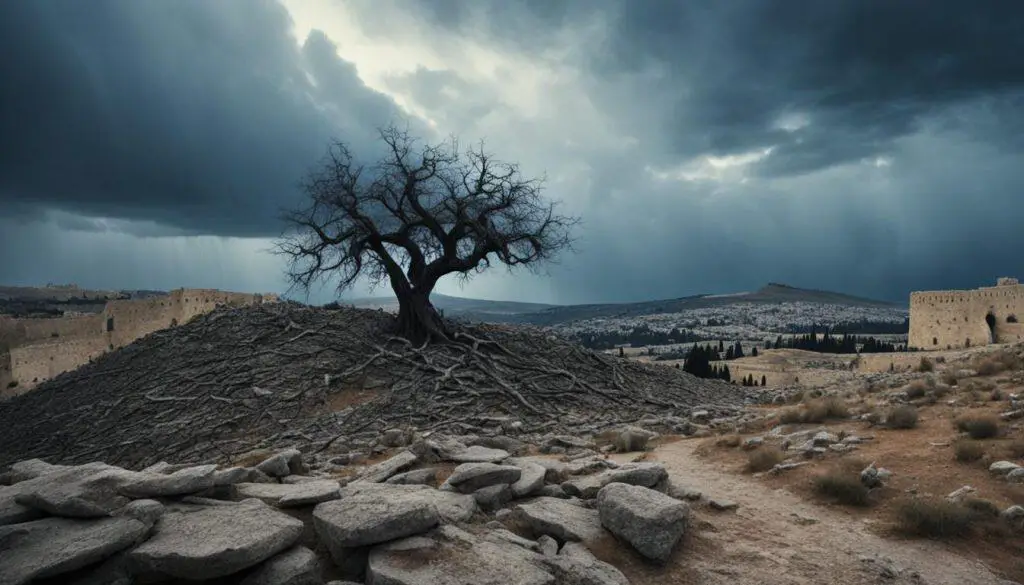
| Zion’s suffering | Jesus’ sacrifice |
|---|---|
| Devastation and sorrow | Pain and anguish |
| Rejection and betrayal | Weight of the world’s sin |
| Desolation of the tabernacle | Agony on the cross |
| Forgotten solemn feasts | Eternal redemption and salvation |
Zion’s Restoration and Resurrection: Hope Through Jesus
In Psalm 102:16, it is prophesied that Zion will be restored. This restoration aligns with the resurrection of Jesus, bringing hope to all who believe. The connection between Zion’s future restoration and Jesus’ victory over death reveals a profound promise of renewal and new life through our faith in Him.
“He will appear in His glory. He will respond to the prayer of the destitute; He will not despise their plea.” (Psalm 102:16)
Just as Jesus triumphantly rose from the grave, Zion will also experience a glorious transformation. This renewal signifies the ultimate victory over sin and death, emphasizing the power of Jesus’ resurrection and the hope it brings to believers.
The Resurrection of Jesus: A Promise Fulfilled
When Jesus rose from the dead, He fulfilled the prophecies that pointed to His resurrection. This remarkable event not only validated His divinity but also confirmed the promise of restoration for Zion and all those who trust in Him.
Jesus’ resurrection symbolizes the victory over sin and death, paving the way for the restoration of all things. Through Him, we have the assurance that just as He triumphed over death, we too will experience eternal life with Him in the renewed Zion.
The Hope of Restoration
Hope springs forth from the promise of Zion’s restoration and Jesus’ resurrection. It reminds us that even in our darkest moments, God’s redemptive plan is at work. As we hold on to this hope, we are encouraged to persevere and live in joyful anticipation of the glorious future to come.
| Zion’s Restoration and Resurrection | Hope Through Jesus |
|---|---|
| Psalm 102:16 | Jesus’ Resurrection |
| In Psalm 102:16, Zion’s future restoration is foretold. | Jesus’ resurrection echoes Zion’s restoration, bringing hope to all who believe. |
| Zion’s restoration signifies the renewal and transformation of God’s people and creation. | Jesus’ victory over death assures us of the promise of restoration and new life. |
| The restoration of Zion is intricately connected to the hope and renewal brought through Jesus’ resurrection. | As believers, we find hope and assurance in the promise of restoration and resurrection through our faith in Jesus. |
Jesus Weeping Over Jerusalem: Zion’s Heart and Spirit
One of the most poignant and heartfelt moments in Jesus’ ministry is found in Luke 19:41-44. In this passage, we witness Jesus weeping over Jerusalem. This emotional scene reveals the deep love and compassion Jesus has for the city that encompasses Zion, the heart of biblical Jerusalem.
As Jesus looked upon Jerusalem, He lamented the impending destruction and the spiritual state of the city. He expressed His longing for Jerusalem to recognize and embrace the true path to peace and salvation. His tears exemplify the heart and spirit of Zion, the divine call for repentance and reconciliation with God.
“If thou hadst known, even thou, at least in this thy day, the things which belong unto thy peace! but now they are hid from thine eyes.”
Jesus’ deep sorrow reflects the anguish of a loving Shepherd, concerned for His lost and wayward sheep. In His weeping, we see the divine heartache for those who refuse to accept the message of hope and redemption. It is a poignant reminder of the tender love and unyielding mercy that Jesus offers to all.
Through Jesus’ tears, we are reminded of Zion’s role as the spiritual center and the longing for humanity’s spiritual well-being. Jesus wept over Jerusalem as a symbol of His desire for the city to embrace the truth and experience the transformational power of God’s love.
“For the days shall come upon thee, that thine enemies shall cast a trench about thee, and compass thee round, and keep thee in on every side, and shall lay thee even with the ground, and thy children within thee; and they shall not leave in thee one stone upon another; because thou knewest not the time of thy visitation.”
In Jesus’ weeping over Jerusalem, we see the profound connection between His love for the city and the heart and spirit of Zion. His tears exemplify the divine longing for spiritual revival and the recognition of God’s presence and visitation.
Jesus’ lamentation calls us to reflect on the condition of our own hearts and cities, urging us to seek a deeper relationship with God.
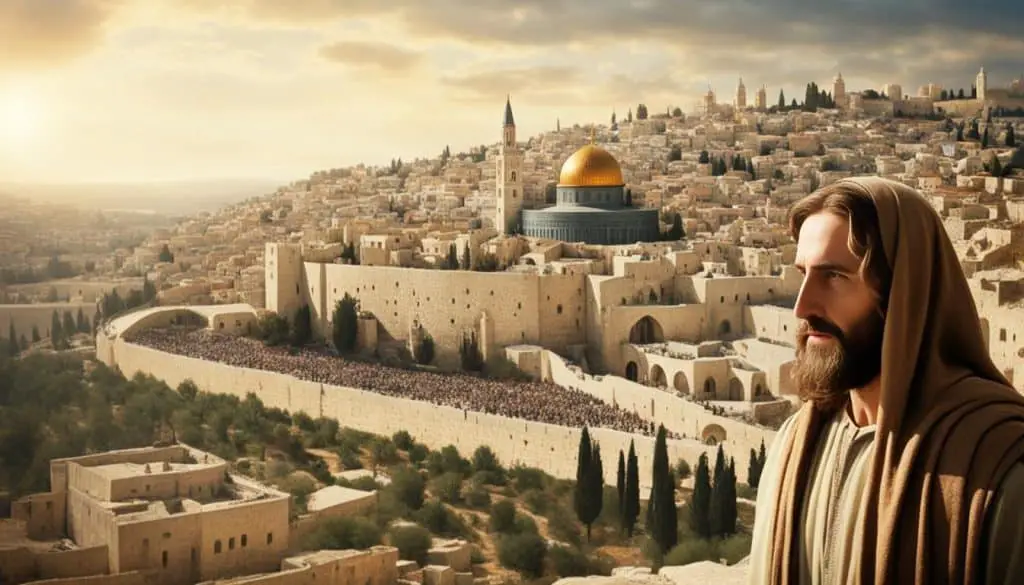
The Consequences of Ignoring Zion’s Heart
The heartbreaking lamentation of Jesus serves as a warning to us all. When we ignore the heart and spirit of Zion, we risk losing sight of the profound truths and blessings that come from living in alignment with God’s will.
Jesus’ words foreshadowed the destruction that would befall Jerusalem, emphasizing the consequences of rejecting God’s call to righteousness.
“Because thou knewest not the time of thy visitation.”
Jesus’ tears over Jerusalem stand as a poignant reminder to heed God’s call and embrace the heart and spirit of Zion. In doing so, we open ourselves to the transformative power of His love and experience the blessings that come from living according to His divine plan.
| Key Takeaways | Biblical References |
|---|---|
| Jesus’ weeping over Jerusalem reflects His deep love and compassion for the city. | Luke 19:41-44 |
| His tears exemplify the heart and spirit of Zion, calling for repentance and reconciliation. | Luke 19:41-44 |
| Jesus’ lamentation highlights the consequences of ignoring Zion’s heart. | Luke 19:41-44 |
| We are called to embrace the heart and spirit of Zion and seek a deeper relationship with God. | Luke 19:41-44 |
The Last Supper in Jerusalem: Zion’s Significance
As you explore the life and ministry of Jesus, it is essential to consider the significance of the Last Supper in Jerusalem, as described in Luke 22:7-13. This event holds deep historical and spiritual importance, connecting it to the significance of Zion, the heart of biblical Jerusalem.
The Last Supper, shared by Jesus and His disciples, represents a pivotal moment in Jesus’ ministry and the fulfillment of Zion’s role in God’s plan of redemption.
It was during this meal that Jesus instituted the sacrament of communion, symbolizing the breaking of His body and the pouring out of His blood for the forgiveness of sins.
“And he sent Peter and John, saying, Go and prepare us the passover, that we may eat.
And they said unto him, Where wilt thou that we prepare?
And he said unto them, Behold, when ye are entered into the city, there shall a man meet you, bearing a pitcher of water; follow him into the house where he entereth in.
And ye shall say unto the goodman of the house, The Master saith unto thee, Where is the guestchamber, where I shall eat the passover with my disciples?
And he shall shew you a large upper room furnished: there make ready.
And they went, and found as he had said unto them: and they made ready the passover.”
– Luke 22:8-13 (KJV)
Jesus’ choice of having the Last Supper in Jerusalem was not arbitrary. Jerusalem, specifically Zion, held great cultural and religious significance in the Jewish tradition. It was the city where God’s presence resided, and the temple was located.
By gathering His disciples in Zion for the Last Supper, Jesus emphasized the connection between His sacrificial mission, the historical significance of Zion, and God’s plan of salvation.
He fulfilled the Old Testament prophecies and foreshadowed His impending crucifixion and resurrection.
To fully grasp the significance of the Last Supper in Jerusalem, it is crucial to understand the context of the Passover celebration.
The Passover commemorated the liberation of the Israelites from slavery in Egypt, and Jesus, as the ultimate Passover Lamb, became the fulfillment of this symbolic event.
The Last Supper and the Passover
The Last Supper marked the fulfillment and transformation of the traditional Passover meal. During this sacred gathering, Jesus took the unleavened bread, representing the Israelites’ hasty departure from Egypt, and declared it as a symbol of His body.
He also took the cup of wine, representing the blood of the Passover lamb that protected the Israelites from the angel of death, and declared it as the new covenant in His blood, which brings forgiveness and the promise of eternal life.
This transformation of the Passover meal during the Last Supper in Jerusalem signifies Jesus’ role as the ultimate sacrificial Lamb, who would take away the sins of the world through His death and resurrection.
As you reflect on the Last Supper in Jerusalem and its connection to Zion, consider the immense love and sacrifice demonstrated by Jesus. Through His deliberate choice to carry out this significant event in Zion, Jesus revealed the culmination of God’s redemptive plan, bringing salvation to all who believe in Him.

| Key Points | Biblical References |
|---|---|
| The Last Supper in Jerusalem signifies the fulfillment of Zion’s role in God’s plan. | Luke 22:7-13 |
| Jesus transformed the traditional Passover meal, signifying His sacrificial mission. | Luke 22:19-20 |
| Zion’s historical and spiritual importance amplifies the significance of the Last Supper. |
Jesus’ Triumphal Entry into Jerusalem: Messianic Expectations
One of the most iconic moments in Jesus’ life is His triumphal entry into Jerusalem, as recorded in Matthew 21:1-11.
This event fulfills the prophecy of Zechariah 9:9, which speaks of the Messiah’s coming as a humble king riding on a donkey. The significance of Jesus’ entry goes beyond the surface spectacle; it holds deep meaning for Zion’s messianic expectations.
As Jesus entered Jerusalem on a donkey, the crowds hailed Him as the Son of David, the awaited Messiah. This act symbolized His fulfillment of the messianic prophecies and His acknowledgment as the long-awaited King.
The people’s shouts of “Hosanna to the Son of David!” reflected their hope and belief in Jesus as the Messiah who would restore Israel and establish a new kingdom.
The scene of Jesus’ triumphal entry resonated with the symbolism and expectations ingrained in the hearts of the people of Zion. This entry signified the culmination of Zion’s hopes for a Messiah who would bring liberation, restoration, and divine justice. It represented the long-awaited fulfillment of Zion’s messianic expectations.
“Say ye to the daughter of Zion, Behold, thy King cometh unto thee, meek, and sitting upon an ass, and a colt the foal of an ass.” – Matthew 21:5 (KJV)
Jesus’ triumphal entry into Jerusalem ignited a sense of awe and anticipation among the people. They recognized the messianic connotations of this event, as Jesus stepped into the role of their long-awaited King.
The choice of a donkey as His mode of transportation highlighted humility, contrasting the expected image of a conquering warrior. In doing so, Jesus fulfilled the prophecies and revealed the true nature of the Messiah.
The triumphal entry into Jerusalem serves as a powerful reminder of the profound connection between Jesus and Zion’s messianic expectations.
It illuminates the significance of Jesus’ role as the promised Messiah and His ability to fulfill the longings of the human heart. Understanding this event deepens our appreciation of Jesus’ mission and His embodiment of God’s redemptive plan.
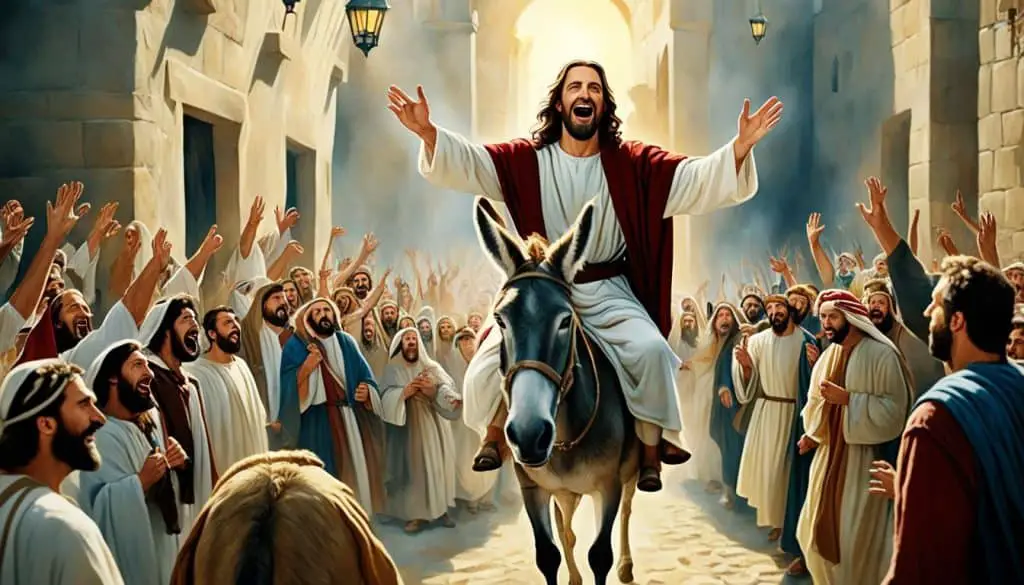
Symbolism in Jesus’ Triumphal Entry
| Symbol | Meaning |
|---|---|
| Donkey | Humility, peaceful reign |
| Palm Branches | Symbol of victory and celebration |
| Hosanna | Acclamation of praise and adoration |
| Son of David | Recognition as the Messiah, heir to David’s throne |
The Crucifixion and Zion’s Redemption: Ultimate Salvation
One of the most profound moments in Jerusalem’s history was the crucifixion of Jesus. As stated in Hebrews 13:12, Jesus was crucified outside the walls of the city. This event holds deep significance as it symbolizes the ultimate redemption and salvation offered through Jesus’ sacrifice.
The crucifixion of Jesus was a pivotal moment in God’s plan for our salvation. By connecting Zion’s redemption with Jesus’ crucifixion, we gain a profound understanding of the depth of God’s love for humanity. It is through Jesus’ sacrificial death on the cross that we find ultimate redemption.
“For God so loved the world, that he gave his only Son, that whoever believes in him should not perish but have eternal life.” -John 3:16
Jesus’ crucifixion outside Jerusalem’s walls signifies that salvation is not confined to a physical location but extends to all people, regardless of their geographical or cultural backgrounds. It is a powerful reminder that the redemption offered by Jesus is universal, accessible to everyone who believes in Him.
The crucifixion and the subsequent resurrection of Jesus are the foundations of our faith. Through His sacrifice, we can experience the ultimate redemption from sin and find eternal life in Him.
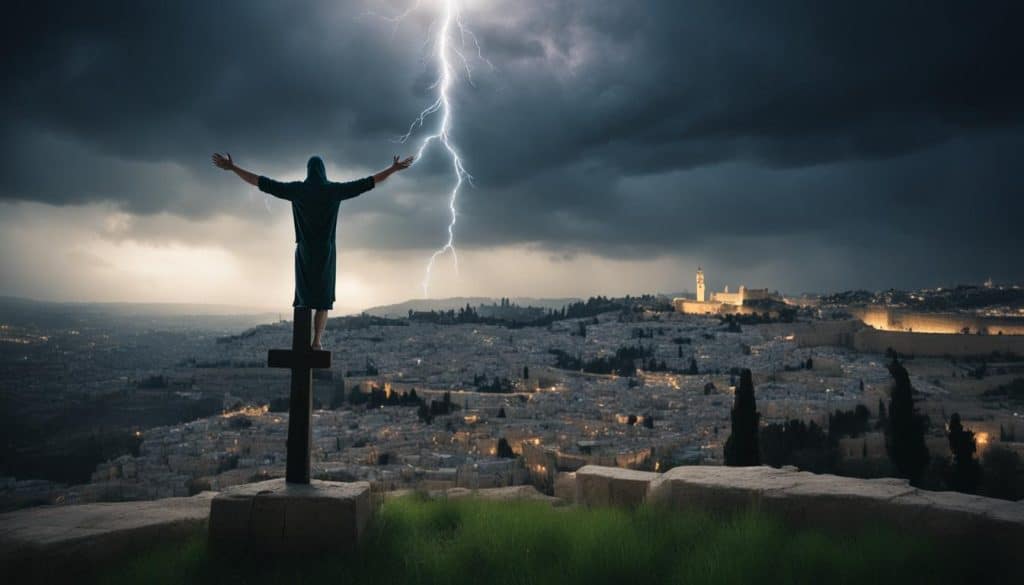
Key Takeaways:
- The crucifixion of Jesus outside Jerusalem’s walls symbolizes the ultimate redemption and salvation.
- Salvation through Jesus is not limited to a specific location; it is accessible to all who believe in Him.
- The crucifixion and resurrection of Jesus form the foundation of our faith, offering us eternal life in Him.
Pentecost and the Outpouring in Zion: Spiritual Awakening
During the celebration of Pentecost in Jerusalem, as described in Acts 2, a transformative event occurred that forever changed Zion.
The Holy Spirit descended upon the believers, resulting in an outpouring of spiritual awakening and empowerment. This remarkable event showcased the power of the Holy Spirit in equipping believers for their ministry.
The outpouring in Zion was a manifestation of the fulfillment of Jesus’ promise to send the Holy Spirit as a helper and guide.
As the disciples gathered in the upper room, they were filled with the Holy Spirit, enabling them to speak in different languages and proclaim the good news of Jesus Christ to people from various nations.
The significance of this outpouring cannot be overstated. It represented a powerful moment of supernatural intervention that marked the birth of the early Christian church.
The disciples, filled with boldness and conviction, went on to preach the Gospel, heal the sick, and perform miraculous signs and wonders – all under the guidance and empowerment of the Holy Spirit.
“And they were all filled with the Holy Ghost, and began to speak with other tongues, as the Spirit gave them utterance.” – Acts 2:4
This outpouring also demonstrated the universal nature of God’s salvation plan. People from different backgrounds and languages were able to hear and understand the message of salvation, regardless of their cultural or linguistic barriers.
It was a powerful testament to the inclusive and transformative power of the Gospel.
The outpouring in Zion serves as a timeless reminder of the Holy Spirit’s role in empowering believers and bringing about spiritual awakening. It reminds us that the same Holy Spirit who descended on that day is available to us today, ready to equip and empower us for our own ministry and service.
Key Takeaways
- The outpouring of the Holy Spirit during Pentecost in Zion brought about a spiritual awakening and empowered the early believers.
- The Holy Spirit’s descent fulfilled Jesus’ promise and enabled the disciples to proclaim the Gospel with boldness and perform miraculous signs and wonders.
- This event showcased the inclusive and transformative power of the Gospel, breaking down cultural and linguistic barriers.
Through the outpouring in Zion, we are reminded of the ongoing presence and work of the Holy Spirit in our lives, empowering us for ministry and spiritual growth.
The Impact of Pentecost’s Outpouring in Zion
| Impacts | Description |
|---|---|
| Spiritual Awakening | The outpouring in Zion brought about a significant spiritual awakening among the believers, leading to a vibrant faith community. |
| Empowerment | The Holy Spirit’s descent empowered the disciples to boldly proclaim the Gospel and perform miraculous signs and wonders. |
| Inclusivity | The outpouring in Zion broke down cultural and linguistic barriers, allowing people from different nations to hear and understand the message of salvation. |
| Establishment of the Church | The outpouring marked the birth of the early Christian church and laid the foundation for its growth and impact. |
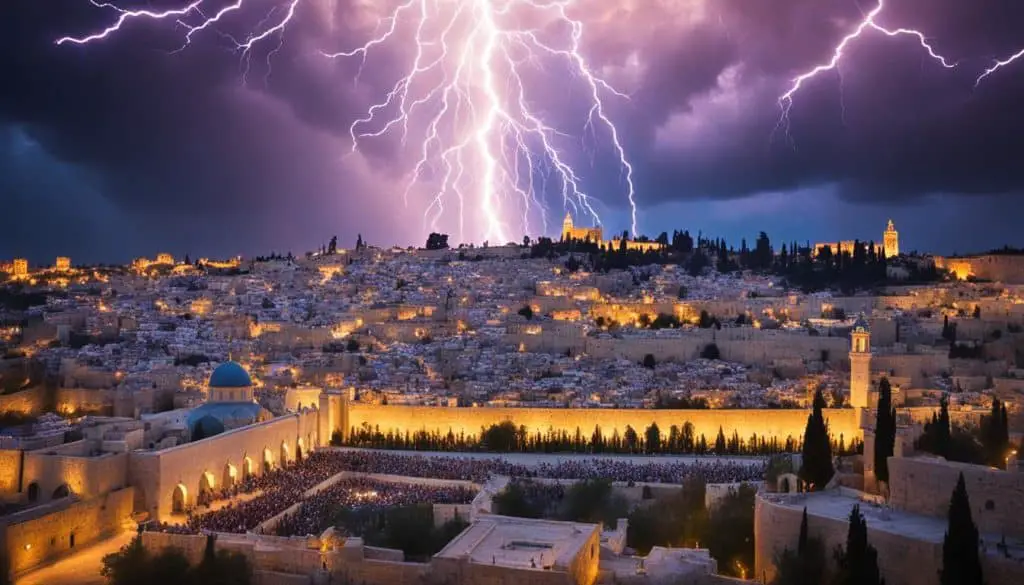
The New Jerusalem: Heavenly Zion and Eternal Life
Revelation 21 introduces us to the glorious vision of the new Jerusalem, a celestial city that can be seen as a heavenly Zion. This revelation offers a glimpse into our future as believers and provides insights into the promise of eternal life and a future kingdom.
The concept of the new Jerusalem is deeply rooted in biblical prophecy. Its significance is further emphasized by its connection to Jesus’ promise of eternal life.
In John 14:2-3, Jesus reassures His disciples, saying, “In my Father’s house are many mansions: if it were not so, I would have told you. I go to prepare a place for you. And if I go and prepare a place for you, I will come again, and receive you unto myself; that where I am, there ye may be also.”
This promise implies that the new Jerusalem will be a place of eternal dwelling for those who believe in Him.
In Revelation 21:1-5, we read,”Then I saw a new heaven and a new earth… And I heard a loud voice from the throne saying, ‘Look! God’s dwelling place is now among the people, and he will dwell with them. They will be his people, and God himself will be with them and be their God. He will wipe every tear from their eyes. There will be no more death or mourning or crying or pain, for the old order of things has passed away.'”
This passage paints a vivid picture of a renewed creation where God’s presence is fully manifested. It is a place of complete healing, joy, and eternal peace.
Central to the concept of the new Jerusalem is the idea that it is a place where heaven and earth converge.
The new Jerusalem embodies a union of the heavenly and the earthly, symbolizing the ultimate fulfillment of God’s kingdom. It represents the culmination of God’s redemptive plan, where the divine and human realms are perfectly aligned.
As believers, the new Jerusalem offers us hope for the future and our eternal destiny. It serves as a reminder that our lives are not confined to this present world but are part of a much grander story unfolding in eternity.
Our faith in Jesus Christ assures us of a place in the new Jerusalem, where we will experience the fullness of God’s glory and dwell in His presence forever.
In conclusion, the new Jerusalem stands as a testament to the promise of eternal life and the fulfillment of God’s kingdom. It signifies the union of heaven and earth and offers hope to all who believe.
Let us fix our hearts and minds on this celestial city, eagerly anticipating the day when we will enter into its eternal splendor.
Jesus as the Cornerstone in Zion: Foundational Significance
In Ephesians 2:20, the Bible refers to Jesus as the cornerstone. This imagery holds profound significance when understanding the foundational role of Zion in biblical history. Just as a cornerstone provides stability, Jesus, as the cornerstone, establishes a firm and unshakable foundation for our faith.
Zion, the heart of biblical Jerusalem, holds a central place in the story of God’s redemptive plan. It is a symbol of His dwelling place among His people, a city connected to David’s kingship, and the place of ultimate salvation. By recognizing Jesus as the cornerstone in Zion, we discover the pivotal role He plays in God’s divine purpose.
When we think of a cornerstone, we envision a stone uniting and supporting the entire structure. Likewise, Jesus, the cornerstone, unifies believers across time and space, forming a spiritual house built on the foundation of the apostles and prophets. His teachings, life, death, and resurrection provide the unifying framework for our faith.
“…Jesus Christ himself being the chief corner stone.” – Ephesians 2:20 (KJV)
Jesus’ foundational significance in Zion goes beyond mere symbolism. It speaks to His authority, power, and eternal nature. Just as a cornerstone determines the alignment and stability of a structure, Jesus’ presence in our lives ensures that we are firmly connected to God’s kingdom and His divine plan.
As we ground ourselves in Jesus, the cornerstone, we find security, purpose, and meaning. Our faith rests on the solid foundation He provides, allowing us to navigate the challenges of life with confidence and hope. Jesus, as the cornerstone in Zion, is the source of our strength and the anchor for our souls.
Building Our Lives on the Cornerstone
Imagine constructing a building without a cornerstone—the structure would lack stability and direction. In the same way, without Jesus as the cornerstone of our faith, our spiritual lives would be adrift. By embracing Jesus’ foundational significance in Zion, we build our lives on the solid rock, ensuring a firm foundation.
When we build on the cornerstone of Jesus, we align our beliefs, values, and actions with His teachings and example. We become part of God’s spiritual house, united with fellow believers in a community of faith. Jesus’ foundational significance in Zion strengthens our relationships, deepens our understanding of God’s love, and grants us access to the blessings of the kingdom.
Let us remember that Jesus is not a passive cornerstone, but an active, living presence in our lives. He intercedes for us, guides us, and empowers us through the Holy Spirit. Jesus, as the cornerstone in Zion, invites us into a vibrant and transformative relationship with Him.
Embracing the Foundational Significance of Zion
The foundational significance of Zion in biblical history and the role of Jesus as the cornerstone provide us with a profound revelation. By recognizing Jesus’ essential place in our faith, we unlock a deeper understanding of His love, grace, and purpose for our lives.
As you reflect on Jesus as the cornerstone in Zion, contemplate how this truth impacts your relationship with Him. Consider the ways His foundational significance shapes your identity, values, and choices. Let Zion’s historical and spiritual importance serve as a reminder of the unshakable foundation Jesus provides in a world of uncertainty.
Embrace Jesus, the cornerstone in Zion, and allow His presence to anchor your life, guiding you towards a future filled with hope and purpose. May you find security, strength, and transformation in Him, confident that Jesus is the sure foundation on which to build your faith.
| Key Takeaways |
|---|
| Jesus is referred to as the cornerstone in Ephesians 2:20. |
| Zion has foundational significance in biblical history. |
| Jesus’ role as the cornerstone provides stability and unity in our faith. |
| Building our lives on Jesus, the cornerstone, ensures a firm foundation. |
| Embracing the foundational significance of Zion deepens our relationship with Jesus. |
What is the significance of Zion in biblical Jerusalem and its connection to Jesus?
Zion holds great significance in biblical Jerusalem and its connection to the messiah’s connection to Jerusalem is deeply rooted in the Old Testament. It is often associated with the dwelling place of God and the future restoration of the city. For Christians, Zion also symbolizes the spiritual kingdom ushered in by Jesus.
Conclusion: Unveiling the Richness of Zion’s Meaning
In this article, we have embarked on a journey through the various aspects of Zion’s significance, delving deep into biblical verses and events that connect with Jesus’ life and mission. By understanding Zion as the heart of biblical Jerusalem, we have unlocked the profound richness of its meaning in the story of faith and redemption.
Zion stands as a symbol of God’s dwelling place, where Jesus, the incarnation of God, walked among us, forging an intimate relationship between divinity and humanity. It is the city of David, a testament to Jesus’ kingship and his role as the promised Messiah. In Zion, we find the place of salvation, where Jesus fulfilled his mission to bring redemption and everlasting hope to all.
We cannot ignore the suffering endured in Zion, which mirrors Jesus’ sacrificial love for us. Just as Zion experienced restoration and resurrection, we find both hope and new life through Jesus, who conquered death and offers us everlasting renewal. His love for Zion is evident in the tears he shed over Jerusalem, revealing a heart deeply connected to the spirit of this sacred place.
In the Last Supper, we witness the pivotal role of Zion in God’s plan as Jesus chose Jerusalem to commemorate his impending sacrifice. This event marked a turning point in human history and highlighted the significance of Zion as the culmination of God’s divine design.
Ultimately, Jesus’ crucifixion outside Jerusalem’s walls became the gateway to redemption, exemplifying the ultimate sacrifice for our salvation.
Pentecost brought a new outpouring in Zion, as the Holy Spirit descended, empowering believers and igniting a spiritual awakening. This transformative event emphasized the role of Zion as a place of profound spiritual experiences and growth.
Looking to the future, we find the promise of the new Jerusalem, a heavenly Zion, where Jesus’ victory over death brings us eternal life and the hope of a glorious kingdom to come.
The cornerstone, Jesus himself, solidifies the foundation of Zion and our faith. With Zion as the heart of biblical Jerusalem, we understand the true meaning of its narrative in the tapestry of faith and redemption.
As we unravel the layers of Zion’s significance, its profound message of love, sacrifice, and hope comes alive, inviting us to deepen our understanding and strengthen our faith in the unchanging God who continues to reveal himself through Zion.

